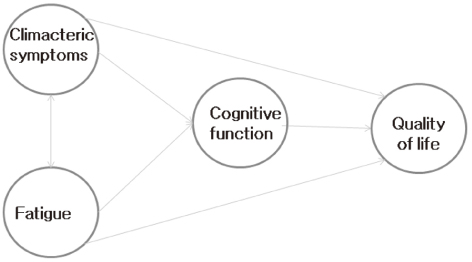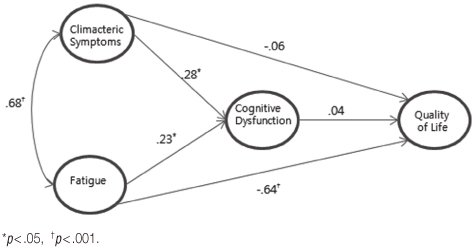Asian Oncol Nurs.
2014 Jun;14(2):58-65. 10.5388/aon.2014.14.2.58.
Impact of Climacteric Symptoms and Fatigue on the Quality of Life in Breast Cancer Survivors: The Mediating Effect of Cognitive Dysfunction
- Affiliations
-
- 1Department of Nursing, Dongyang University, Yeongju, Korea. gdkim@dyu.ac.kr
- KMID: 2269459
- DOI: http://doi.org/10.5388/aon.2014.14.2.58
Abstract
- PURPOSE
The purpose of this study was to test hypothetical model of quality of life (QOL) in breast cancer survivors and to test the mediating effects of cognitive dysfunction.
METHODS
This study was conducted from December 1st, 2013 to February 28th, 2014. 164 breast cancer survivors were recruited from A, D, and Y city in Korea. The instruments used in this study were climacteric symptoms, fatigue, cognitive dysfunction, and the QOL scales. Data were analyzed using descriptive statistics, correlation, and pathway.
RESULTS
Cognitive dysfunction was directly affected by climacteric symptoms and fatigue. QOL was directly affected by fatigue, However climacteric symptoms and cognitive dysfunction did not effect on QOL directly. Impact of climacteric symptoms on QOL, mediating effect of cognitive dysfunction was not confirmed. In addition, effect of fatigue on the QOL, the mediating effect of cognitive dysfunction was not.
CONCLUSIONS
Effects of climacteric symptoms on QOL was not mediated by cognitive dysfunction, Furthermore effects of fatigue on QOL was not mediated by cognitive dysfunction.
MeSH Terms
Figure
Cited by 2 articles
-
Impact of Cognitive Function and Cancer Coping on Quality of Life among Women with Post-chemotherapy Breast Cancer
Yoon Jung Kim, Sook Jung Kang
Korean J Women Health Nurs. 2016;22(3):182-190. doi: 10.4069/kjwhn.2016.22.3.182.Quality of Life and Supportive Care Needs of Back-to-Work Breast Cancer Survivors
Su Jeong Han, Hye Won Kim, Dae Sung Yoon, Mi Ran Kim
Korean J Adult Nurs. 2019;31(5):552-561. doi: 10.7475/kjan.2019.31.5.552.
Reference
-
1. National Cancer Information Center. 2012 Cancer Statistics. Accessed April 22, 2014. http://www.cancer.go.kr/cms/statics/incidence/index.htm.2. Brem S, Kumar NB. Management of treatment-related symptoms in patients with breast cancer: Current strategies and future directions. Clin J Oncol Nurs. 2011; 15:63–71.3. Korean Breast Cancer Society. The breast cancer facts and figures. Seoul: Korean Breast Cancer Society;2012.4. Kenne Sarenmalm E, Ohlen J, Jonsson T, Gaston-Johansson F. Coping with recurrent breast cancer: Predictors of distressing symptoms and health-related quality of life. J Pain Symptom Manage. 2007; 34:24–39.
Article5. Ganz PA. Breast cancer, menopause, and long-term survivorship: Critical issue for the 21th century. Am J Med. 2005; 118:Suppl 12B. 136–141.
Article6. Vearncombe KJ, Rolfe M, Wright M, Pachana NA, Andrew B, Beadle G. Predictors of cognitive decline after chemotherapy in breast cancer patients. J Int Neuropsychol Soc. 2009; 15:951–962.
Article7. Weiss B. Evaluation of multiple neurotoxic outcomes in cancer chemotherapy. Adv Exp Med Biol. 2010; 678:96–112.
Article8. Park YM. A structural model for quality of life in breast cancer patient [dissertation]. Seoul: Kyunghee Univ.;2005.
Article9. Boykoff N, Moien M, Subramanian SK. Confronting chemobrain: An in-depth look at survivors' reports of impact on work, social networks, and health care response. J Cancer Surviv. 2009; 3:223–232.
Article10. Cella D, Davis K, Breitbart W, Curt G. Cancer-related fatigue: Prevalence of proposed diagnostic criteria in a United States sample of cancer survivors. J Clin Oncol. 2001; 19:3385–3391.
Article11. Moon JM. Menopause symptoms, fatigue, and quality of life in postchemotherapy breast cancer survivors [dissertation]. Seoul: Yonsei Univ.;2009.12. Byar KL, Berger AM, Bakken SL, Cetak MA. Impact of adjuvant breast cancer chemotherapy on fatigue, other symptoms, and quality of life. Oncol Nurs Forum. 2006; 33:E18–E26.
Article13. Vearncombe KJ, Rolfe M, Wright M, Pachana NA, Andrew B, Beadle G. Predictors of cognitive decline after chemotherapy in breast cancer patients. J Int Neuropsychol Soc. 2009; 15:951–962.
Article14. Weiss B. Evaluation of multiple neurotoxic outcomes in cancer chemotherapy. Adv Exp Med Biol. 2010; 678:96–112.
Article15. Jenkins V, Shilling V, Deutsch G, Bloomfield D, Morris R, Allan S, et al. A 3-year prospective study of the effects of adjuvant treatment on cognition in women with early stage breast cancer. Br J Cancer. 2006; 94:828–834.
Article16. Calvio L, Peugeot M, Bruns GL, Todd BL, Feuerstein M. Measures of cognitive function and work in occupationally active breast cancer survivors. J Occup Environ Med. 2010; 52:219–227.
Article17. Brezden CB, Phillips KA, Abdolell M, Bunston T, Tannock IF. Cognitive function in breast cancer patients receiving adjuvant chemotherapy. J Clin Oncol. 2000; 18:2695–2701.
Article18. Nelson CJ, Nandy N, Roth AJ. Chemotherapy and cognitive deficit: Mechanisms, findings, and potential interventions. Palliat Support Care. 2007; 5:273–280.
Article19. Downie FP, Mar Fan HG, Houede-Tchen N, Tannock IF. Cognitive function, fatigue, and menopausal symptoms in breast cancer patients receiving ajuvant chemotherapy: Evaluation with patient interview after formal assessment. Psychooncology. 2006; 15:921–930.
Article20. Avis NE, Brockwell S, Colvin A. A universal menopausal syndrome? Am J Med. 2005; 118:Suppl 12B. 37–46.
Article21. Bradshaw J. Cognition, depression and fatigue in multiple sclerosis. ACNR. 2008; 8(4):15–17.22. Yu JP. Concept of structural equation modeling and understanding. Amos 4.0~20.0. Seoul: Hannarae;2012. p. 276.23. Jo HS, Lee KJ. A comparative study on climacteric symptoms of natural menopausal women and artificial menopausal women. J Korean Acad Nurs. 2001; 31:692–702.
Article24. Functional Assessment of Chronic Illness Therapy. FACIT-Fatigue scale-Korean version., Functional assessment of cancer therapy-breast cancer version 4-Korean version. Accessed Nomember 22, 2013. Availble at: http://www.facit.org/FACITOrg/Questionnaires.25. Chung BY, Choi EH, Kim GD, Kim KH, Byun HS. Development of the cognitive function scale for breast cancer patients. Seoul: Ministry of Education, Science and Technology;2011.26. Kim GD, Chung BY, Kim KH, Byun HS, Choi EH. Comparison of climacteric symptoms and cognitive impairment in breast cancer survivors and healthy women. Asian Oncol Nurs. 2013; 13:11–17.
Article27. Byun HS, Kim GD. Impacts of fatigue, pain, anxiety, and depression on the quality of life in patients with breast cancer. Asian Oncol Nurs. 2012; 12:27–34.
Article28. Kim GD, Kim KH. Symptom cluster and quality of life in patients with breast cancer undergoing chemotherapy. Korean J Adult Nurs. 2011; 23:434–445.29. Kwon EJ, Yi MS. Distress and quality of life in breast cancer survivors in Korea. Asian Oncol Nurs. 2012; 12:289–296.
Article30. Yu SJ, Yang S, Yoon JY. The relationship among depression, social support, and gender role barrier in middle aged women. J Korean Acad Psychiatr Ment Health Nurs. 2000; 9:619–630.
- Full Text Links
- Actions
-
Cited
- CITED
-
- Close
- Share
- Similar articles
-
- Comparison of Climacteric Symptoms and Cognitive Impairment in Breast Cancer Survivors and Healthy Women
- Impacts of Fatigue, Pain, Anxiety, and Depression on the Quality of Life in Patients with Breast Cancer
- Symptom Cluster and Quality of Life in Patients with Breast Cancer undergoing Chemotherapy
- Impact of Cognitive Function and Cancer Coping on Quality of Life among Women with Post-chemotherapy Breast Cancer
- The Impact of Social Cognitive Constructs on Dietary Behaviors in Breast Cancer Survivors



